新概念英语第二册 Lesson4 An exciting trip (共26张PPT)
文档属性
| 名称 | 新概念英语第二册 Lesson4 An exciting trip (共26张PPT) |
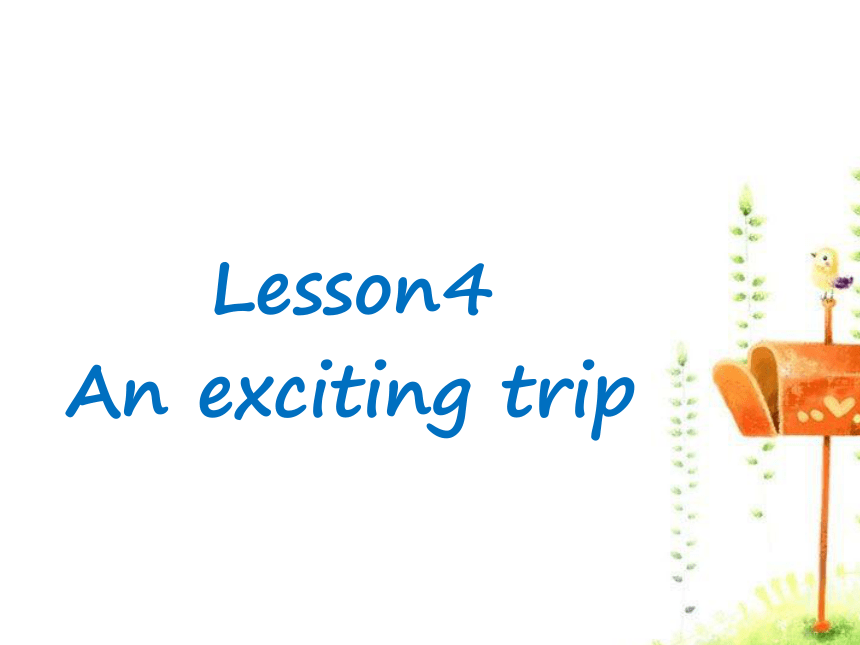
|
|
| 格式 | pptx | ||
| 文件大小 | 941.3KB | ||
| 资源类型 | 教案 | ||
| 版本资源 | 新概念英语 | ||
| 科目 | 英语 | ||
| 更新时间 | 2023-10-07 00:00:00 | ||
图片预览

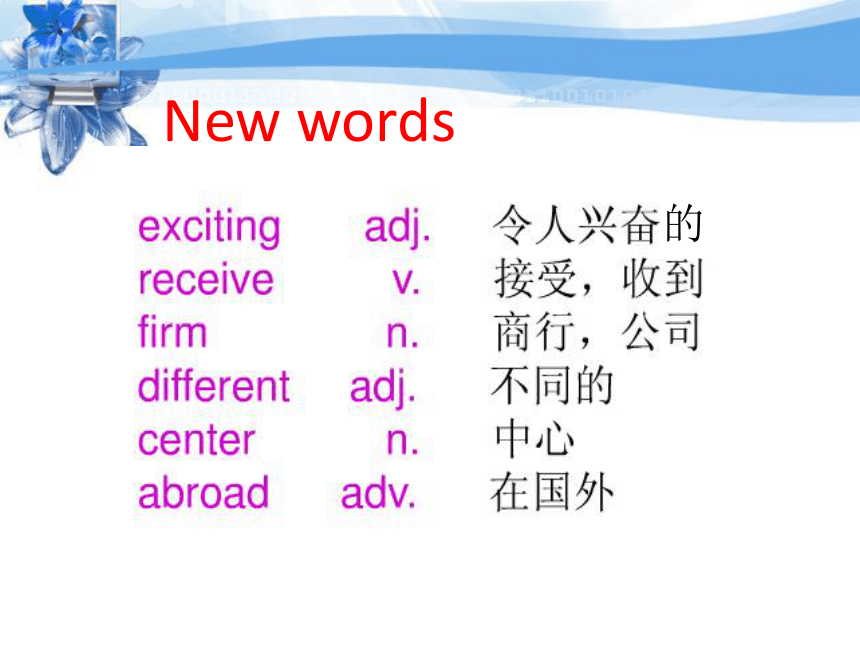

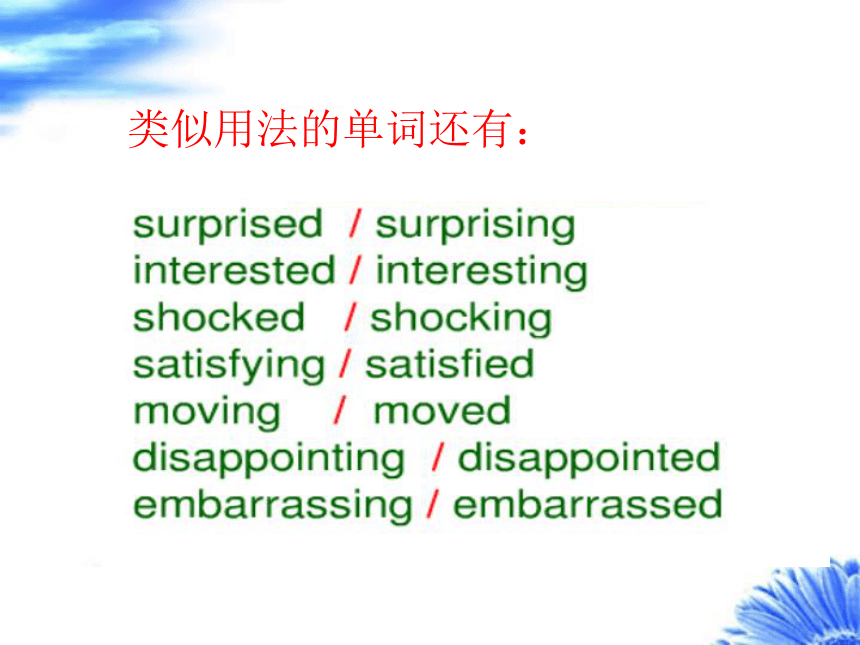
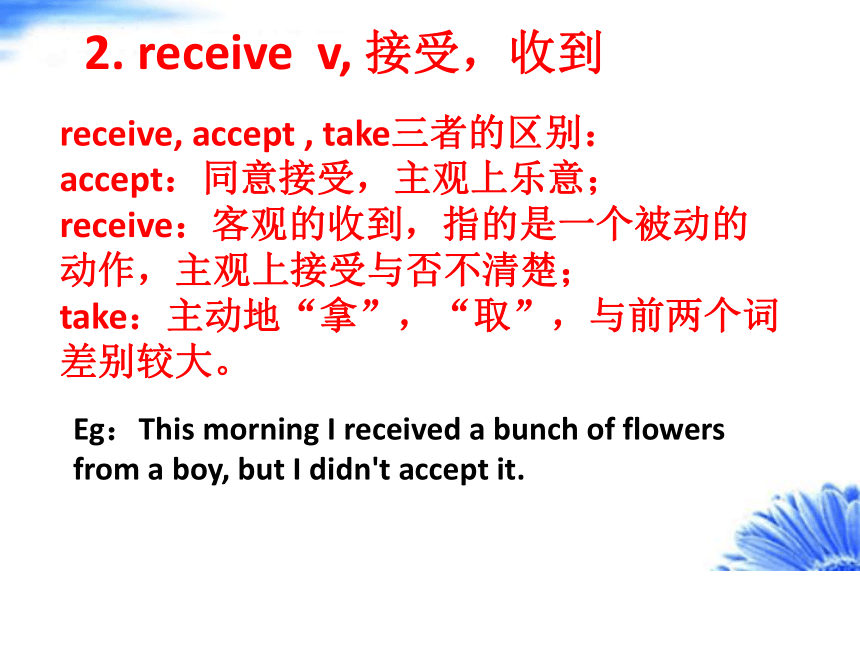
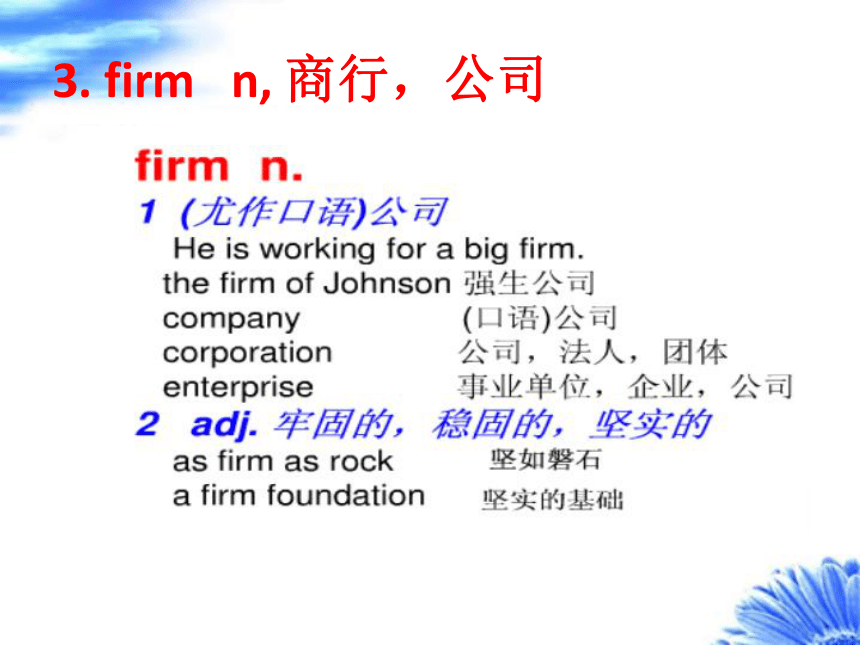
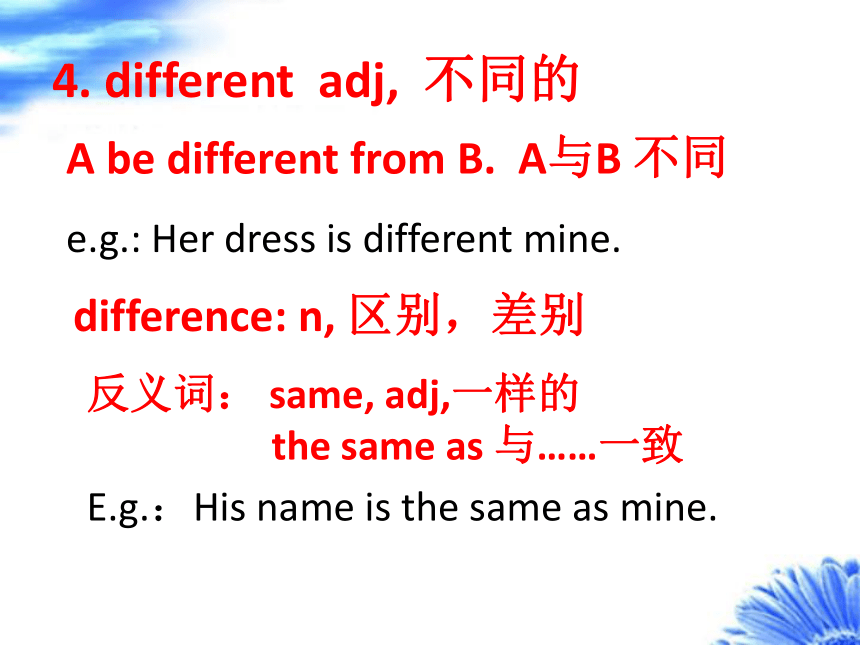
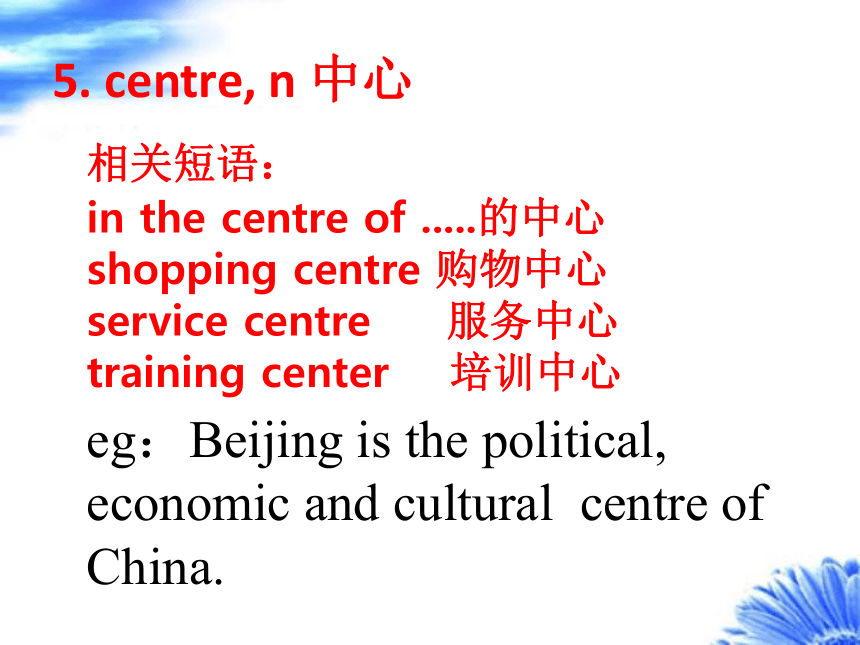
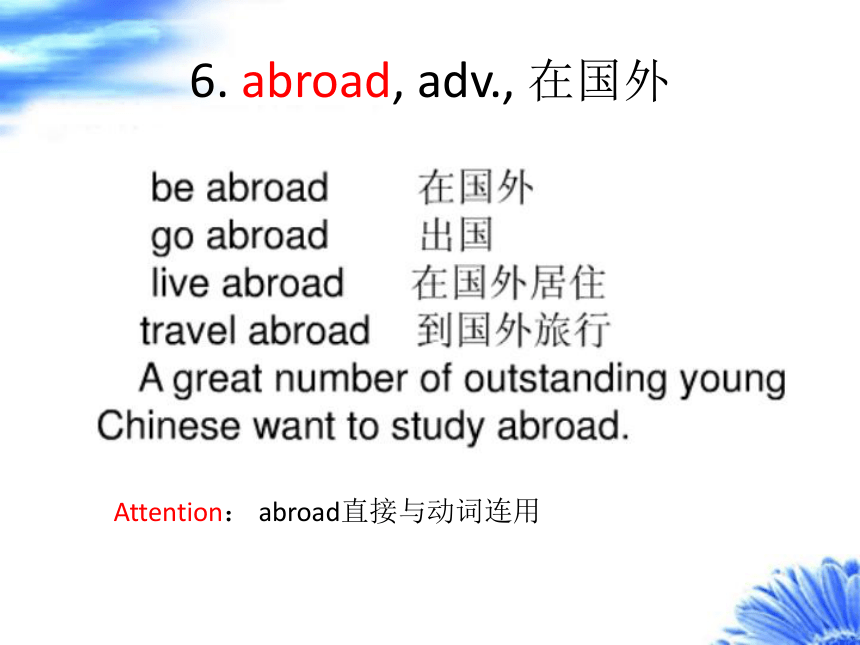
文档简介
(共26张PPT)
Lesson4
An exciting trip
New words
的
1. exciting, adj,令人兴奋的
excited adj, 感到兴奋的(修饰人)
excite v, 令……兴奋
Eg:1. The excited girl is looking forward to her exciting first date with her “Mr. Right”.
2. The interesting story excites him very much.
Attention: --ed结尾的形容词——自己感到(人)……
--ing结尾的形容词——令人感到(物)……
类似用法的单词还有:
2. receive v, 接受,收到
receive, accept , take三者的区别:
accept:同意接受,主观上乐意;
receive:客观的收到,指的是一个被动的动作,主观上接受与否不清楚;
take:主动地“拿”,“取”,与前两个词差别较大。
Eg:This morning I received a bunch of flowers from a boy, but I didn't accept it.
3. firm n, 商行,公司
4. different adj, 不同的
A be different from B. A与B 不同
e.g.: Her dress is different mine.
difference: n, 区别,差别
反义词: same, adj,一样的
the same as 与……一致
E.g.:His name is the same as mine.
5. centre, n 中心
相关短语:
in the centre of .....的中心
shopping centre 购物中心
service centre 服务中心
training center 培训中心
eg:Beijing is the political, economic and cultural centre of China.
6. abroad, adv., 在国外
Attention: abroad直接与动词连用
阅读短文回答问题:
receive sth from sb
从某人那里收到某物
2、He has been there for six months.
has been + in 地点 已经在某地
E.g.: He has been in Beijing for one year.
He has been in America for two years.
注意:非延续性动词后不能跟表示时间段的词连用!
如:arrive、leave、buy、lie、close等。
a number of ..... 大量的 + 动词(复数)
the number of .....大量的 + 动词(单数)
4、He has just bought an Australian car and has gone to Alice springs, a small town in the center of Australia.
区分:
has gone to 去了某地(没回来)
has been to曾经去过某地(已回来)
E.g.:Have you been to Paris
she has gone to Beijing last week.
fly to 飞往某地
fly away 飞走
fly out 飞出
6、My brother has never been abroad before, so he is finding this trip very exciting.
before 在句子后是副词, 译为“在此之前”,是现在完成时态的标志
常与现在完成时连用的副词和副词短语:
before (以前); so far(到目前为止);
so far this morning(到上午为止); up to now(直到现在);
up to the present(直到目前); just(刚刚);
recently(最近); already(已经);
lately(最近); now(现在);
for 一段时间; since+时间;
still(还;仍); at last(终于);
finally(最终);
疑问句和否定句中常用ever,yet,never,not…ever 等。
find的用法
1. find +宾语+形容词做宾补
E.g.:Did you find the film disappointing
I find this book interesting.
2. Find后面可以直接跟宾语:find sb./ sth.
E.g.: I found that dog yesterday.
3. Find 后面可跟从句做宾语:
find that…/find +wh疑问词引导的宾语从句。
E.g.:I found that they had made a mistake.
4. find 后可跟双宾语:
find sb. sth.= find sth for sb.
E.g.: I found him a good job.= I found a good job for him.
5. find sb./ sth. doing sth.
发现某人/某物正在干……
现在完成时的用法
现在完成时的句型
肯定句:主语+have/has +过去分词
1. I have lost my wallet.
2. Mary has been ill for three days.
3. We have had four texts this semester.
2. 否定句:主语+have/has + not+过去分词
I have not seen the film.
She hasn’t changed her idea.
My parent's haven’t come back.
3. 一般疑问句:
Have/has提前+主语+过去分词+其他?
4. 特殊疑问句:特殊疑问词+一般疑问句?
I have finished my homework just now.
----- What have you done just now
2. She has been in Shanghai for 2 years.
-----Where has she been for 2 years.
过去分词的构成
注意:还有一些不规则变化的动词必须自己积累,背诵!
Eg:understand----understood, cut----cut
找出文章中的现在完成时
I have just received a letter from my brother, Tim. He is in Australia. He has been there for six months. Tim is an engineer. He is working for a big firm and he has already visited a great number of different places in Australia. He has just bought an Australian car and has gone to Alice springs, a small town in the center of Australia. He will soon visit Darwin. From there, he will fly to Perth. My brother has never been abroad before, so he is finding this trip very exciting.
Lesson4
An exciting trip
New words
的
1. exciting, adj,令人兴奋的
excited adj, 感到兴奋的(修饰人)
excite v, 令……兴奋
Eg:1. The excited girl is looking forward to her exciting first date with her “Mr. Right”.
2. The interesting story excites him very much.
Attention: --ed结尾的形容词——自己感到(人)……
--ing结尾的形容词——令人感到(物)……
类似用法的单词还有:
2. receive v, 接受,收到
receive, accept , take三者的区别:
accept:同意接受,主观上乐意;
receive:客观的收到,指的是一个被动的动作,主观上接受与否不清楚;
take:主动地“拿”,“取”,与前两个词差别较大。
Eg:This morning I received a bunch of flowers from a boy, but I didn't accept it.
3. firm n, 商行,公司
4. different adj, 不同的
A be different from B. A与B 不同
e.g.: Her dress is different mine.
difference: n, 区别,差别
反义词: same, adj,一样的
the same as 与……一致
E.g.:His name is the same as mine.
5. centre, n 中心
相关短语:
in the centre of .....的中心
shopping centre 购物中心
service centre 服务中心
training center 培训中心
eg:Beijing is the political, economic and cultural centre of China.
6. abroad, adv., 在国外
Attention: abroad直接与动词连用
阅读短文回答问题:
receive sth from sb
从某人那里收到某物
2、He has been there for six months.
has been + in 地点 已经在某地
E.g.: He has been in Beijing for one year.
He has been in America for two years.
注意:非延续性动词后不能跟表示时间段的词连用!
如:arrive、leave、buy、lie、close等。
a number of ..... 大量的 + 动词(复数)
the number of .....大量的 + 动词(单数)
4、He has just bought an Australian car and has gone to Alice springs, a small town in the center of Australia.
区分:
has gone to 去了某地(没回来)
has been to曾经去过某地(已回来)
E.g.:Have you been to Paris
she has gone to Beijing last week.
fly to 飞往某地
fly away 飞走
fly out 飞出
6、My brother has never been abroad before, so he is finding this trip very exciting.
before 在句子后是副词, 译为“在此之前”,是现在完成时态的标志
常与现在完成时连用的副词和副词短语:
before (以前); so far(到目前为止);
so far this morning(到上午为止); up to now(直到现在);
up to the present(直到目前); just(刚刚);
recently(最近); already(已经);
lately(最近); now(现在);
for 一段时间; since+时间;
still(还;仍); at last(终于);
finally(最终);
疑问句和否定句中常用ever,yet,never,not…ever 等。
find的用法
1. find +宾语+形容词做宾补
E.g.:Did you find the film disappointing
I find this book interesting.
2. Find后面可以直接跟宾语:find sb./ sth.
E.g.: I found that dog yesterday.
3. Find 后面可跟从句做宾语:
find that…/find +wh疑问词引导的宾语从句。
E.g.:I found that they had made a mistake.
4. find 后可跟双宾语:
find sb. sth.= find sth for sb.
E.g.: I found him a good job.= I found a good job for him.
5. find sb./ sth. doing sth.
发现某人/某物正在干……
现在完成时的用法
现在完成时的句型
肯定句:主语+have/has +过去分词
1. I have lost my wallet.
2. Mary has been ill for three days.
3. We have had four texts this semester.
2. 否定句:主语+have/has + not+过去分词
I have not seen the film.
She hasn’t changed her idea.
My parent's haven’t come back.
3. 一般疑问句:
Have/has提前+主语+过去分词+其他?
4. 特殊疑问句:特殊疑问词+一般疑问句?
I have finished my homework just now.
----- What have you done just now
2. She has been in Shanghai for 2 years.
-----Where has she been for 2 years.
过去分词的构成
注意:还有一些不规则变化的动词必须自己积累,背诵!
Eg:understand----understood, cut----cut
找出文章中的现在完成时
I have just received a letter from my brother, Tim. He is in Australia. He has been there for six months. Tim is an engineer. He is working for a big firm and he has already visited a great number of different places in Australia. He has just bought an Australian car and has gone to Alice springs, a small town in the center of Australia. He will soon visit Darwin. From there, he will fly to Perth. My brother has never been abroad before, so he is finding this trip very exciting.
同课章节目录
